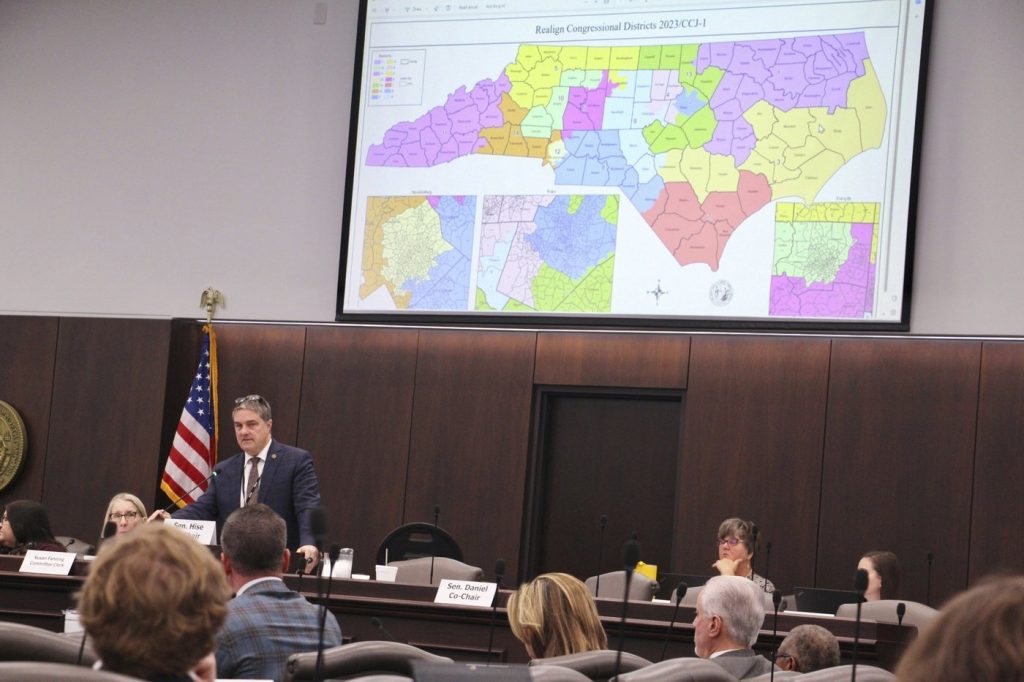RALEIGH, N.C. (AP) — A significant legal battle is unfolding in North Carolina as federal lawsuits challenge the congressional and legislative districts drawn by Republican leaders. The lawsuits allege that these maps illegally dilute Black voting power, undermining the Voting Rights Act and the U.S. Constitution.
A trial is set to begin on Monday in Winston-Salem, presided over by a three-judge panel. The plaintiffs argue that GOP legislative leaders acted unlawfully when they enacted new electoral maps in October 2023. The Republican officials, however, assert that their decisions were based on lawful partisan considerations rather than racial factors.
The new district lines were utilized in the 2024 elections, resulting in Republicans retaining majorities in both the North Carolina General Assembly and U.S. House of Representatives. Notably, they flipped three congressional seats that were previously held by Democrats who chose not to seek reelection due to the unfavorable redistricting. This shift transformed a balanced 7-7 congressional delegation into a 10-4 Republican majority, thus aiding the GOP in maintaining control of the House and advancing former President Donald Trump's policies.
An unfavorable ruling for the Republicans could necessitate a redraw of the maps for the upcoming 2026 elections, which would complicate their efforts to preserve partisan dominance. On the other hand, if the current maps are upheld, they could remain in effect until the 2030 elections, solidifying the Republican advantage.
The trial stems from two lawsuits filed in late 2023. One lawsuit, led by the North Carolina NAACP, Common Cause, and several Black residents, challenges the redrawn state House and Senate maps, as well as U.S. House districts. A second lawsuit, filed by nearly 20 Black and Latino voters, specifically targets four congressional districts they claim are examples of illegal racial gerrymandering.
The plaintiffs argue that the maps have been manipulated such that Black voters are unable to elect their preferred candidates, which they believe constitutes a violation of the Voting Rights Act. They allege that the mapmakers intentionally fragmented concentrated Black voting populations and diluted their influence by dispersing them into districts with white majorities, which has historically benefited Republican candidates. For instance, in the area around Greensboro, High Point, and Winston-Salem, the plaintiffs contend that Republicans divided these cities' substantial Black demographic among various U.S. House districts, leading to significant electoral consequences for Democratic candidates, including the decision of then-Rep. Kathy Manning to retire due to unfavorable district changes.
Meanwhile, Republican representatives maintain that the mapmaking process adhered to legal standards, emphasizing the use of partisan data derived from statewide election outcomes rather than racial data, which contradicts previous judicial admonitions regarding race in districting. They reference a 2019 Supreme Court ruling and a separate state Supreme Court decision from April 2023, which limited claims of partisan gerrymandering.
The three-judge panel overseeing the case comprises judges who were nominated by Republican presidents: Judge Allison Rushing (Donald Trump), Judge Thomas Schroeder (George W. Bush), and Judge Richard Myers (Donald Trump). The trial is scheduled to last for several days, concluding no sooner than July 9. Expected testimonies include input from plaintiffs, state legislators, redistricting experts, and historians. A prompt ruling is unlikely, as the legal teams have until early August to submit additional arguments.
North Carolina has a storied history of battles over redistricting in federal courts. Landmark U.S. Supreme Court cases in the 1980s, 1990s, and 2000s laid foundations regarding racial bias and the permissible use of race in district formation. The current maps were established after a Republican-dominated state Supreme Court essentially reversed prior judicial decisions made when the court was under Democratic control in 2022.
There are also two additional lawsuits pending that challenge the 2023 district boundaries. In North Carolina, elections are often closely contested, with Democrats maintaining control of the governor's office for the majority of the past three decades. However, Republicans have held legislative power since 2011, and they wield significant influence over the redistricting process, which the governor cannot veto.











